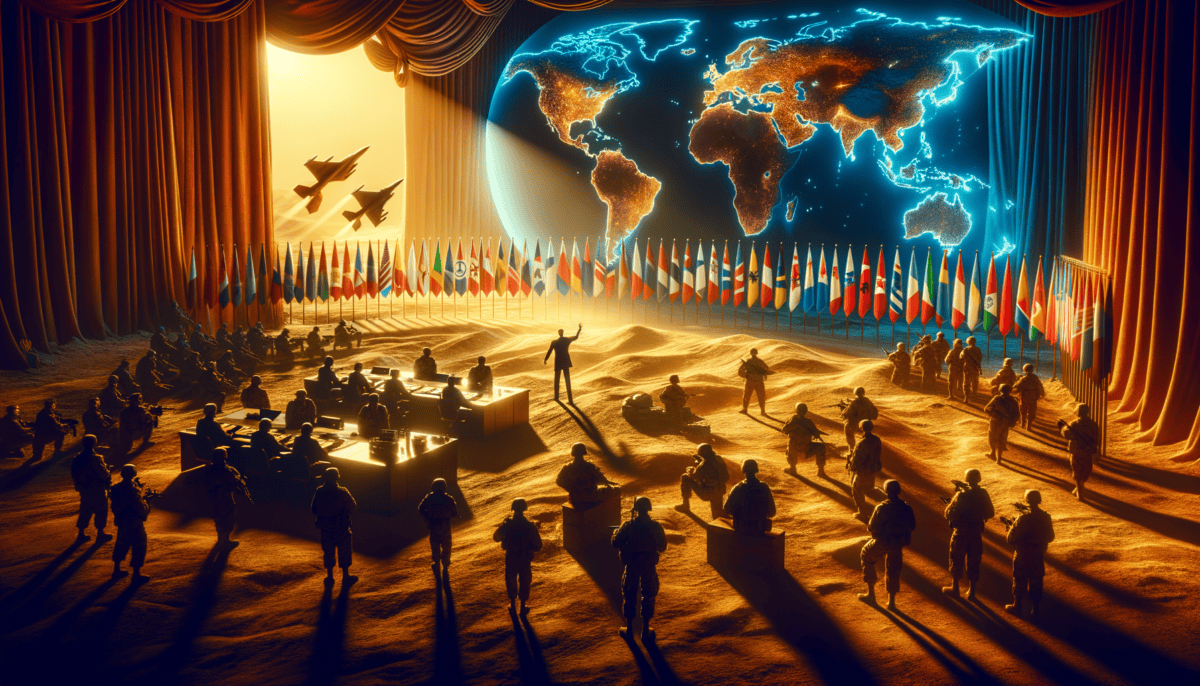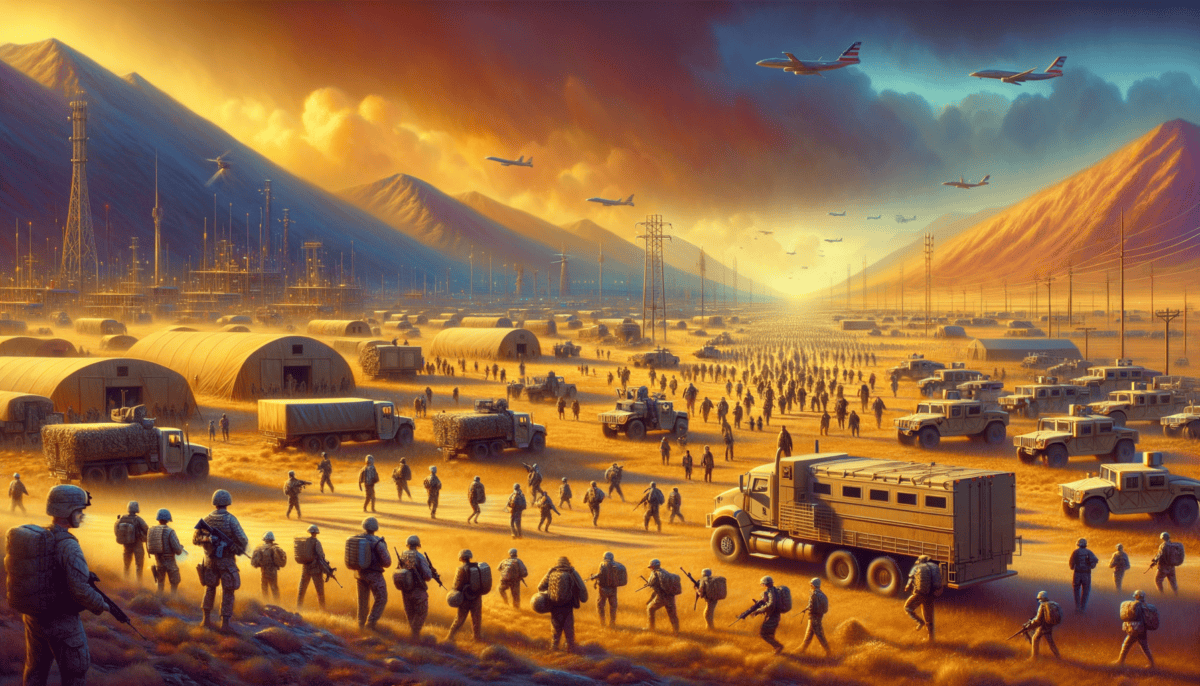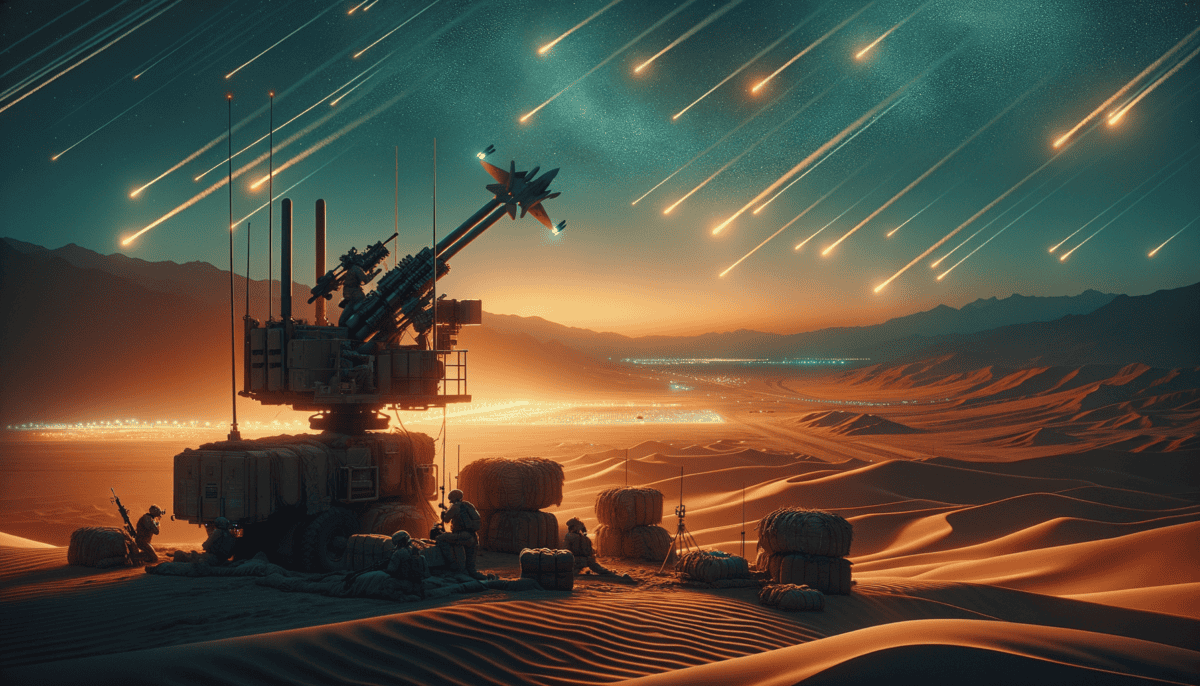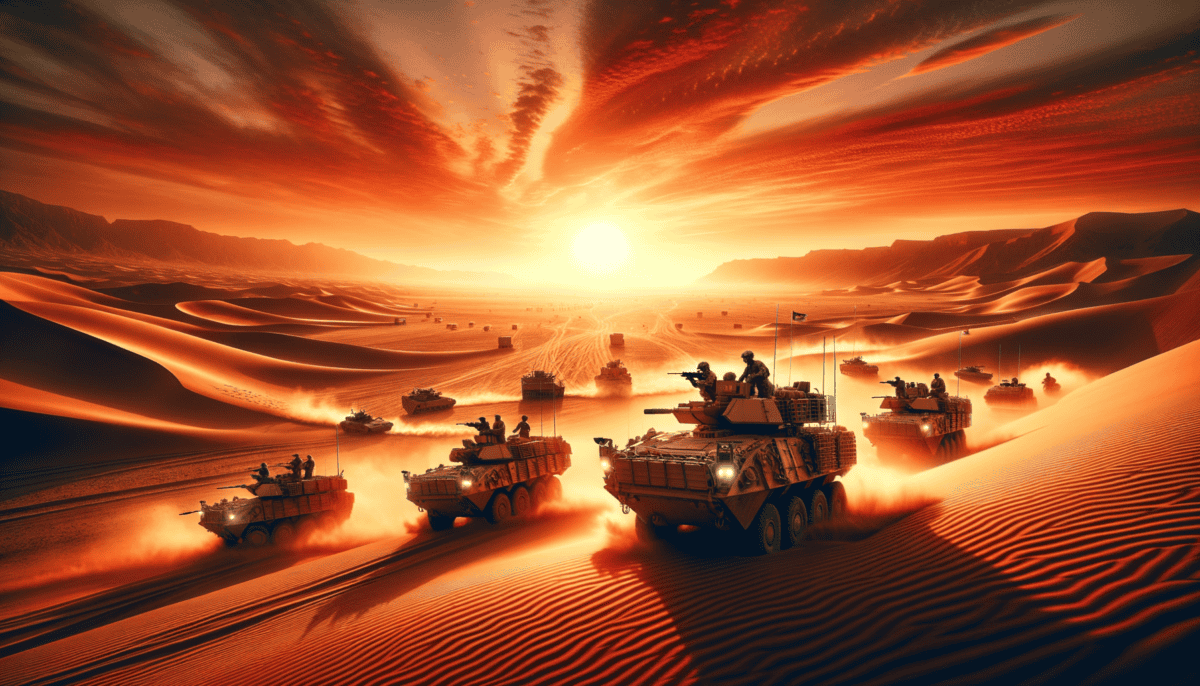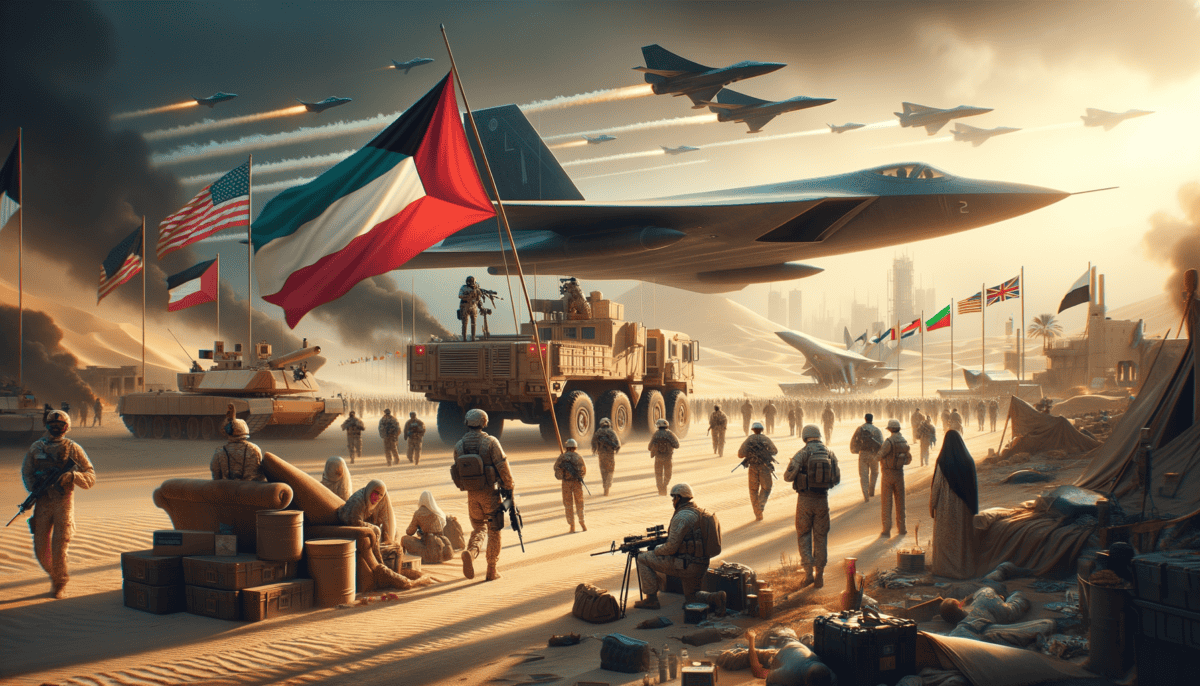The Shadow of Conflict
The hot desert wind blew across Kuwait’s sandy shores on August 2, 1990. It was a day that would change everything.
Ten-year-old Adil watched from his bedroom window as Iraqi tanks rolled down his street in Kuwait City. The sounds of rumbling engines filled the morning air.
“Why are they here, Baba?” Adil asked his father.
“Saddam Hussein, Iraq’s leader, wants to take our country,” his father replied softly. “He thinks Kuwait’s oil should belong to Iraq.”
A Morning That Changed Everything
Iraqi soldiers were everywhere. They took over buildings, streets, and parks. Many families like Adil’s had to leave their homes quickly. They packed only what they could carry.
Around the world, people watched their TVs in shock. No one expected one country to just take over another country like this.
President George H.W. Bush of America spoke to the nation:
“This will not stand. We cannot let one country steal another country’s freedom.”
The World Responds
Countries from all over started talking about what to do. It was like when a bully takes someone’s lunch money – other kids need to stand up and help.
Here’s what different countries did to help Kuwait:
- America sent ships to protect Saudi Arabia
- England promised to help fight back
- France said they would join too
- Arab countries asked Iraq to leave Kuwait
- The United Nations told Iraq to stop
Oil and Freedom
Kuwait’s oil was very important. Many countries needed it to run their cars and heat their homes. ⛽
But this wasn’t just about oil. It was about standing up for what’s right. Big countries shouldn’t be allowed to take over small countries just because they want to.
Adil and his family made it safely to Saudi Arabia. As they sat in their temporary home, his father held him close.
“Will we ever go home?” Adil asked.
“Yes, habibi,” his father smiled. “The world won’t let Iraq keep our country. They will help us get it back.”
As summer turned to fall, more and more countries joined together. They were getting ready for something big. Something that would change the Middle East forever.
Saddam Hussein thought he could just take what he wanted. But he was about to learn that the world would stand together against bullies, no matter how big they were.
Building the Alliance
In Washington D.C., President Bush sat at his big desk in the Oval Office. The phone hadn’t stopped ringing all day. He was calling leaders from all around the world.
“We need to stand together,” President Bush told the Prime Minister of Britain. “This is about doing what’s right.”
Friends Coming Together
One by one, countries joined the team to help Kuwait. It was like building the biggest group of friends ever!
Tom, a young soldier from Texas, watched the news with his family:
“Mom, how many countries are helping us?” he asked.
“More than 30!” she replied. “From all over the world!”
“When good people work together, amazing things can happen,” Tom’s father added.
Planning the Big Help
Countries helped in different ways:
- Saudi Arabia let soldiers use their land
- Japan gave money to help pay for everything
- Egypt sent soldiers to join the team
- Germany shared important supplies
- Canada sent ships to help
Making Rules at the United Nations
At the United Nations building in New York, people from all countries met. They made important rules:
“Iraq must leave Kuwait by January 15,” they said. “If they don’t, we will make them leave.”
They wrote these rules on special papers called resolutions. It was like giving Iraq a timeout if they didn’t behave. ⏰
Getting Ready
Ships, planes, and tanks started moving to the Middle East. Soldiers packed their bags and said goodbye to their families.
Sarah, a nurse from Canada, wrote in her diary:
“Today I’m leaving to help. Mom is worried, but I told her this is important. We’re helping make the world better.”
In Kuwait, Adil and other kids heard about all the countries coming to help. It gave them hope.
A World United
President Bush appeared on TV again:
“We have friends from every corner of the world,” he said. “Together, we will show that bullies cannot win.”
The world was changing. Countries that used to fight each other were now working together. They were getting ready for something big.
As summer ended, everyone knew: this wasn’t just about Kuwait anymore. This was about showing that the whole world could work together to fix big problems.
The next step would be even bigger. It would be called Operation Desert Shield, and it would change everything…
The Great Desert Shield
The hot sun blazed over Saudi Arabia as huge planes landed one after another. Inside were brave soldiers from many countries. They were coming to protect Saudi Arabia and get ready to help Kuwait. ️
Life in the Desert
Private Sarah Johnson wiped sweat from her face. The desert was very different from her home in Michigan.
“It’s like being on another planet,” she wrote to her little brother. “The sand goes on forever, and it’s so hot!” ️
“We drink lots of water and wear special clothes to stay cool. Our tanks and trucks need special care too – sand gets everywhere!”
Building a Desert City
The soldiers worked hard to build their new home in the desert. They set up:
- Tents for sleeping
- Big kitchens for food
- Hospitals for sick people
- Places to fix vehicles
- Special areas for planes
Training Together
Soldiers from different countries learned to work as one team. They practiced:
“Left, right, left!” called out Sergeant Mike as troops marched together. American soldiers trained next to British tanks while French planes flew overhead.
Carlos, a young mechanic from Spain, taught others how to fix trucks in the sandy conditions:
“Sand is like tiny enemy soldiers,” he joked. “It gets into everything and causes trouble!”
Helping Iraq’s Neighbors
Countries around the world stopped trading with Iraq. This was called sanctions. It was like putting Iraq in a timeout until they left Kuwait.
Meanwhile, reporters from TV stations came to see what was happening:
“This is Tom Bradley, reporting from Saudi Arabia,” one said. “Thousands of soldiers are here, protecting this land and getting ready.”
Making Friends
Even though they were far from home, soldiers made new friends. They shared:
• Stories about their homes
• Different kinds of food
• Games and sports
• Languages and customs
Ready for Anything
As months passed, more soldiers, tanks, and planes arrived. They were getting stronger every day.
General Norman Schwarzkopf, the leader of all these forces, spoke to his troops:
“You are the finest soldiers in the world,” he said. “Together, we will show that bullies cannot win.”
Back in Kuwait, people heard about Operation Desert Shield. It gave them hope that help was coming.
The soldiers knew something big was coming. They kept training and getting ready. Soon, they would need all their practice for something even bigger – Operation Desert Storm.
As winter approached, the desert winds grew cooler. Change was in the air. The biggest test was still to come…
Thunder in the Sky
The clock struck midnight on January 17, 1991. Suddenly, the quiet desert night exploded with light and sound. Operation Desert Storm had begun! ✈️
The First Night
Captain Tom Rodriguez sat in his F-15 fighter jet, soaring through the clouds. Below him, hundreds of planes filled the sky like birds moving together.
“This is Eagle One, target in sight,” he radioed. “Remember everyone, we’re making history tonight.”
The planes carried special weapons called “smart bombs.” These bombs were like video games – pilots could guide them right to their targets!
New Ways of Fighting
This war showed the world something new. The Coalition forces had:
- Planes that could hide from radar
- Computers that helped guide bombs
- Night vision goggles to see in the dark
- Satellites to talk to each other
- TV cameras on missiles
News from the Sky
People all over the world watched the war on TV. Reporter Lisa Chen stood on a rooftop in Saudi Arabia:
“The night sky lights up like Fourth of July fireworks,” she said. “But these aren’t celebrations – this is history happening right before our eyes.”
Brave Pilots
Sarah Thompson was one of the first female pilots in the war. She flew her A-10 plane low and slow:
“We call my plane the ‘Warthog’ because it’s not pretty, but it gets the job done,” she smiled. “We’re here to protect our friends.”
Day after day, planes took off from desert runways. They worked to:
• Stop Iraqi planes from flying
• Break down enemy radar
• Protect ships in the sea
Working Together
Pilots from many countries flew side by side. British planes protected American bombers. French jets shared the sky with Saudi Arabian fighters.
Success in the Air
After just a few days, Coalition planes ruled the sky. Iraqi planes couldn’t fly without being spotted. Many Iraqi pilots flew their planes to Iran to escape!
General Chuck Horner, who led the air war, spoke to his pilots:
“You’ve done something amazing,” he said. “You’ve shown what happens when good people work together to stop bullies.”
The air war went on for weeks. Every day, planes took off into the bright desert sky. They were making the way safe for what would come next – the ground troops were getting ready for their turn.
Racing Through the Sand
The desert rumbled on February 24, 1991, as thousands of tanks and vehicles started moving. The ground war had begun! �tanks
Desert Warriors
Private Maria Sanchez checked her map as her tank rolled forward. Sand stretched as far as she could see.
“It’s like being in an ocean of sand,” she told her crew. “But instead of ships, we have tanks!”
The Coalition army had special tools to help them fight:
- GPS devices to find their way
- Night vision goggles to see in the dark
- Special tanks that could drive fast in sand
- Radios to talk to other soldiers
- Helicopters watching from above
The Big Trick
General Norman Schwarzkopf had a clever plan. He made the Iraqi army think the attack would come from one direction. But surprise! The real attack came from somewhere else!
Heroes in the Sand
Sergeant James Wilson drove his medical truck, helping injured soldiers:
“We’re not just here to fight,” he said. “We’re here to help people and make things right.”
The soldiers faced many challenges:
• Hot sun during the day
• Cold nights in the desert
• Sandstorms that made it hard to see
• Long distances to travel
Working as One Team
Soldiers from different countries worked together like best friends. British tanks rolled next to American ones. French soldiers shared their water with Saudi Arabian troops.
Freeing Kuwait
After just 100 hours – that’s about four days – Kuwait was free! Iraqi soldiers gave up quickly when they saw how strong the Coalition was.
In Kuwait City, people celebrated in the streets. They waved flags and hugged the soldiers who helped free their country.
Victory in the Desert
Colonel Ahmed Al-Sabah from Kuwait stood in his hometown:
“Today, we can go home again,” he smiled. “Thank you to all our friends who helped us.”
The ground war was one of the fastest victories in history. The Coalition forces had:
• Moved faster than anyone thought possible
• Worked together perfectly
• Used their special tools and training well
• Helped free a whole country
As the tanks drove back to their bases, soldiers knew they had been part of something important. They had shown that when bullies try to take what isn’t theirs, good people will stand up and stop them.
Peace Returns to Kuwait
The sun rose on February 28, 1991, marking a special day. President George H.W. Bush announced that Kuwait was free!
Celebration Time
Little Sara, a Kuwaiti girl, jumped with joy as she watched soldiers march through Kuwait City:
“Look, Mama! The soldiers saved our home!” she shouted, waving her small Kuwaiti flag.
People celebrated in many ways:
- Dancing in the streets
- Sharing food with soldiers
- Hanging flags from buildings
- Hugging their returning families
- Singing songs of freedom
Helping Hands
Captain Lisa Chen led her medical team through Kuwait City. They helped people who needed medicine and food.
“We’re not just soldiers,” she said. “We’re friends helping friends get back on their feet.”
Cleaning Up
The war left some big problems to fix:
Oil wells were burning, making the sky dark. Special firefighters from around the world came to help put them out.
Engineer Tom Roberts worked with his team:
“It’s like putting out hundreds of birthday candles,” he explained to local children. “But much, much bigger!”
Learning Important Lessons
The Persian Gulf War taught everyone some big lessons:
• When countries work together, they can stop bullies
• New technology can help win wars faster
• Taking care of people after a war is just as important as winning
Stories to Remember
Grandfather Hassan sat with his grandchildren in their rebuilt Kuwait home:
“Remember this story,” he said softly. “Remember how people from all over the world came to help us. That’s what makes our world special.”
A New Beginning
Kuwait started building again. New houses went up. Children returned to school. Families reunited. ️
The war was over, but something amazing had happened. Countries learned they could work together to help others. They showed that friendship and teamwork can overcome any challenge.
Today, Kuwait is a busy, happy place. Its story teaches us that even after hard times, good things can happen when people help each other. The Persian Gulf War showed us the power of countries working together for peace – a lesson we still remember today.


